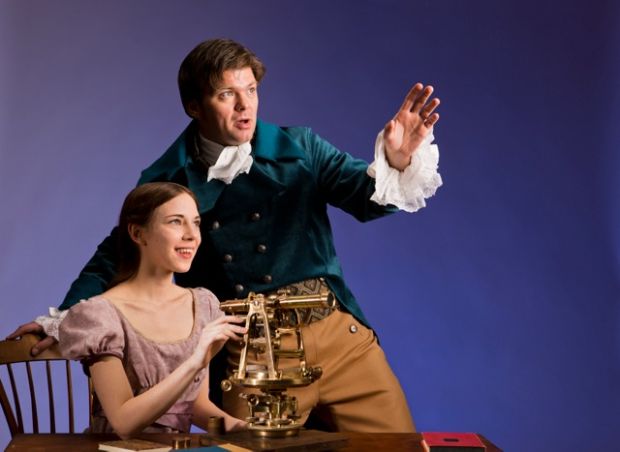Arcadia and Plain Language
A couple of weeks ago, Miss E and I went to a performance of Tom Stoppard's Arcadia, my favorite Stoppard, and a play I love overall. It's about sex, entropy, garden design, celebrity, academic infighting, and the role of technology in what we think of as knowledge. Of all of his plays it melds intellect and emotion most effectively. If you ever get a chance to see it, go.
Thomasina and Septimus
It's not an easy play. Though the staging is relatively simple, with just one set (the same room in two different time periods, 1809 and "the present"—though as time goes by and technology changes I think it will be necessary to change that to "1993") the dialog is complex, something like an Amy Sherman-Palladino sitcom about Eliezer Yudkowsky and Robin Hanson as malingering coworkers at Chernobyl. I thought the Concord Players did a creditable job.
We attended a Sunday matinee in Concord, Massachusetts. Like most wealthy communities in Massachusetts, Concord skews old. Play attendance skews old. Matinees skew old. I am into my 60s, Miss E somewhat younger, and we were among the youngest people in the audience. This is relevant.
The problem of realistic accents
The play is set in an English country house, 1809 and 1993. So the actors, all of them American, spoke in English accents. I presume it was some general southeast English BBC accent, or at least an attempt at it. I don't have a particularly good ear for accents, so take my judgment with a grain of salt.
Its not easy to do an accent that isn't your own. It's a skill, like acting itself is a skill, and requires a lot of work to get right. English actors seem to be very good at it, so that hearing Dominic West or Idris Elba speak in their natural accent after watching The Wire, where they play Americans, and not only that, but specific Americans from two different strata of Baltimore, is startling. But most actors, even bigshot pros, have trouble with accents. It doesn't help that there isn't a "Southern" accent, or an "English" accent—there are instead a wide range of variations by region, class, and age.
The audience at Arcadia was mostly bewildered. They couldn't hear a lot of the dialog (not enough people admit their need of hearing assistance, and even fewer bite the bullet and spring for a really good hearing aid), and what they did hear they had trouble understanding.
Pretend it's translated from another language
This may be solving a localized problem rather than a general one, but I'd like to see theater companies abandon accents when it isn't relevant to the story. If Arcadia was a Russian play translated into English, the actors would have felt comfortable using their own accents and focusing on the extremely dense and precise dialog. And the audience would have had a better chance of understanding them.
The linguist John McWhorter (he took over Slate's linguistics podcast, Lexicon Valley, awhile ago, and is always entertaining) suggests that Shakespeare should be translated into modern English, since no one really understands a lot of the dialog anymore. In some ways Russians and Germans, who have always loved Shakespeare, understand him better than modern English speakers do, because he was translated into the contemporary versions of those languages.
But it's a bit like translating Thucydides. As I understand it, his prose was difficult and weirdly structured right from the beginning, kind of like Thomas Carlyle, or Thomas Hobbes, who happens to be the author of a really hard-to-read early translation of History of The Peloponnesian War that I somewhat over-optimistically purchased not too long ago. I have not managed to scrabble more than a few paragraphs up its rugged rocky slopes.
You have to be careful not to squeeze the specific cragginess and bagginess out of it, the way fanfic writers and shippers always crush every bit of unpredictability and eccentricity out of the works they insist they love.
But I've wandered a bit far afield here. Accents or not, if you get a chance to see Arcadia, take it.
What accent do you think is appropriate?
Are there works that really should be done in their original dialect, even if subtitles are necessary?
